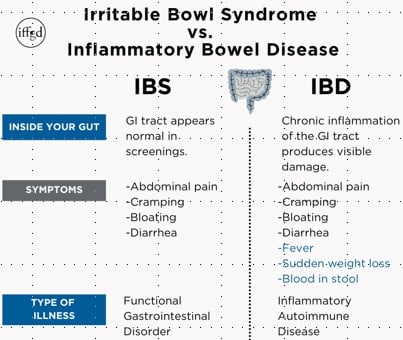IBS affects up to 5-10% of individuals worldwide and affects children and adults of both genders. Although IBS does not shorten a person’s life span, it is associated with a large health care and economic burden.
Irritable bowel syndrome (IBS) is a disorder in which people have reoccurring issues with abdominal discomfort or pain that is associated in some way to their bowel movements. Typically, this intermittent abdominal pain is accompanied by diarrhea, constipation, or alternating episodes of both (mixed). Bloating or distention of the abdomen is also common, and other symptoms may be present as well.
Some patients with IBS, particularly those whose problems started after food poisoning or traveler’s diarrhea (post-infectious IBS) can gradually get better
over time. Others will have IBS for their entire lives.
In IBS, the normal functioning of the bowels are affected and don’t work properly. Sometimes motility is abnormal – the bowels move too much or too often, and sometimes they don’t move enough or often enough.
Usually sensory perception is abnormal – the nerves in the bowels are more sensitive to stretch or movement and this can lead to more pain.
These abnormalities may in turn relate to disordered brain-gut communication, genetic factors, infection and altered gut bacteria, and intestinal inflammation.
Subtypes of Irritable Bowel Syndrome
| Irritable bowel syndrome with diarrhea (IBS-D) – symptoms of diarrhea occur most often Irritable bowel syndrome with constipation (IBS-C) – symptoms of constipation occur most often Irritable bowel syndrome mixed (IBS-M) – symptoms of both constipation and diarrhea occur |
Identifying the subgroup of IBS is helpful when deciding which tests and/or treatments are best.
The severity of the symptoms should also be considered. Grouping IBS patients by their most common bowel movement type is also useful for researchers who are trying to better understand what causes IBS or the best way to care for patients with IBS.
Treating IBS
The key to achieving relief for IBS is for people to embrace the understanding that IBS is a condition in which multiple factors can contribute to its development and can trigger the symptoms. Some examples include:
- There may be a family history of IBS or disease with similar symptoms.
- Symptoms may be preceded by a GI infection, such as food poisoning.
- Symptoms may be related to stressful events
A knowledgeable healthcare provider can diagnose IBS by careful review of your symptoms, a physical examination, and selected diagnostic procedures that are often limited to a few basic tests.
The first line of treatment for IBS includes general measures such as:
- establishing an effective patient-physician relationship,
- obtaining education about IBS, and
- implementing lifestyle changes, which may be associated with symptoms.
If lifestyle changes do not completely relieve IBS symptoms, medications and/or other therapies may be helpful.














